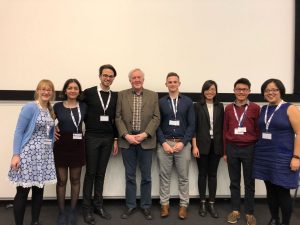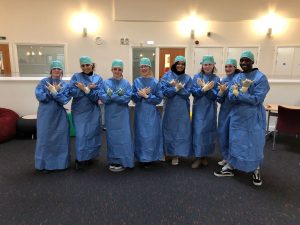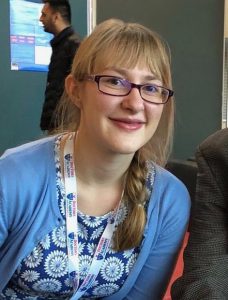On the cold and frosty morning of Saturday 20th January 2018, HYMS hosted its 5th Undergraduate Surgical conference and welcomed over 140 delegates and faculty members to the Ron Cooke Hub at the University of York. This increasingly popular event, aimed at medical students and local sixth form students interested in a career in surgery, promised and delivered an exciting day packed with workshops, student poster presentations and, if that was not busy enough, four incredible talks from internationally renowned keynote speakers: Colonel Paul Parker, Miss Claire Murphy, Mr Paul McMaster, and Professor Derek Alderson. I was extremely grateful to have been a part of the organising committee for this great event and I hope to be able to give you an insight into the day in this blog post.
War Zone Surgery
The first talk of the day was from Colonel Paul Parker, a consultant trauma and orthopaedic surgeon who has served on the battlefields in Afghanistan. He described in vivid detail how war often drives innovation in trauma care in order to improve the outcome for the patient, such as how best to treat wounds from improvised explosive devices, as well providing us with some shocking examples of the types of injuries he saw whilst on deployment. Interestingly, he also outlined the post-graduate pathway that can be taken to become a Military Surgeon like himself. If you are interested in knowing more about this, you may find this article by Lt Col Jonathan Reynolds, written for the Royal College of Surgeons helpful.
Women in Surgery
The next brilliant keynote speaker was Miss Claire Murphy, a consultant oncoplastic breast surgeon from Airedale General Hospital, West Yorkshire. A passionate advocate for ‘less than full time’ surgical training, Miss Murphy detailed how boundaries within surgical training are gradually being broken down to encourage the representation of women in the surgical field. Miss Murphy sought to explain how we should all feel able to follow our career ambitions by describing her own experiences as a mother and a successful surgeon.
Humanitarian Surgery
Kick-starting the afternoon session following lunch was an inspiring presentation by Mr Paul McMaster, Senior Surgical Advisor for Médecins Sans Frontières, on global and humanitarian medicine. As well as giving a brief overview of the charity’s ethos and history, Mr McMaster talked about his own personal experiences of working in poverty-stricken and war-torn areas providing vital medical care to the civilians there who need it. This gave us not only an insight into the conditions that he and his colleagues experienced, but also the awful conditions and injuries inflicted during war.
“I want to be a surgeon”
 The final talk of the day was by the current President of the Royal College of Surgeons of England: retired upper gastrointestinal surgeon, Professor Derek Alderson. In a talk centred around the path to becoming a surgeon, Professor Alderson shared some key qualities he strongly believes that the surgeons of the future should hold (along with many jokes!). He explained how surgeons are “only as good as the weakest person on the team”: it is therefore imperative that anyone wishing to enter surgery must be able to work independently, but also be able to work effectively with their colleagues, especially in order to keep up with the cutting-edge research and medical advancements in clinical practice. In addition, Professor Alderson highlighted the importance of resilience and strength: don’t be disheartened by failure as the ability to “get back on your bike” after a knock-back is an essential quality for most medical specialities, but definitely for surgery. Concluding this brilliant talk with questions from the audience, Professor Alderson was asked what advice he would give his twenty-year old self; his reply was to “find someone to inspire you”.
The final talk of the day was by the current President of the Royal College of Surgeons of England: retired upper gastrointestinal surgeon, Professor Derek Alderson. In a talk centred around the path to becoming a surgeon, Professor Alderson shared some key qualities he strongly believes that the surgeons of the future should hold (along with many jokes!). He explained how surgeons are “only as good as the weakest person on the team”: it is therefore imperative that anyone wishing to enter surgery must be able to work independently, but also be able to work effectively with their colleagues, especially in order to keep up with the cutting-edge research and medical advancements in clinical practice. In addition, Professor Alderson highlighted the importance of resilience and strength: don’t be disheartened by failure as the ability to “get back on your bike” after a knock-back is an essential quality for most medical specialities, but definitely for surgery. Concluding this brilliant talk with questions from the audience, Professor Alderson was asked what advice he would give his twenty-year old self; his reply was to “find someone to inspire you”.
Workshops and poster presentations
 Throughout the day there were a multitude of workshops available, such as basic and advanced suturing, orthopaedic skills, and even a station on virtual realities for surgical simulation. Delegates could choose to participate in three workshops, which made sure that everyone got a great experience across the surgical field. I was based on the ‘gowning and gloving’ station for the Widening Participation sixth form students, and I was also able to try out the Brain Lab station and the spinal neurosurgery workshop in my lunch break – with some success!
Throughout the day there were a multitude of workshops available, such as basic and advanced suturing, orthopaedic skills, and even a station on virtual realities for surgical simulation. Delegates could choose to participate in three workshops, which made sure that everyone got a great experience across the surgical field. I was based on the ‘gowning and gloving’ station for the Widening Participation sixth form students, and I was also able to try out the Brain Lab station and the spinal neurosurgery workshop in my lunch break – with some success!
There were a great selection of posters displaying current research by medical students, majority of whom were from HYMS! There were many interesting topics, but only three could be chosen as the winners – with a selection of great medical revision resources as prizes.
All in all, it was an amazing day, with some very positive feedback from attendees. If you think you have even a slight interest in surgery, or just want to know a bit more about a surgical career, I would highly recommend attending the conference next year: I’m already looking forward to it!
To purchase tickets for next year’s HYMS Surgical Conference (19th January 2019), please click here.
A big thank you to Adeel Mushtaq for filling me in with details about the talks that I missed.
 Samantha Strickland is a third-year medical student at HYMS. She has a keen interest in neurosurgery and research. In her spare time she enjoys listening to music, baking, eating out, spending time with family (and dog!) and swimming.
Samantha Strickland is a third-year medical student at HYMS. She has a keen interest in neurosurgery and research. In her spare time she enjoys listening to music, baking, eating out, spending time with family (and dog!) and swimming.

